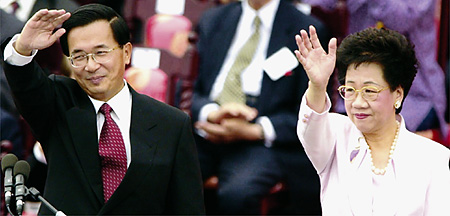Chen Shui-bian << chuhn shwee byahn >> (1950-…) was president of Taiwan from May 2000 to May 2008. Chen belonged to Taiwan’s Democratic Progressive Party (DPP), and his election as president marked the end of 50 years of Kuomintang (KMT) rule in Taiwan. The Kuomintang, also known as the Nationalist Party, had fled to Taiwan in 1949 when its members were driven from mainland China by the Communists. See Taiwan (History).

Although Chen had always desired independence for Taiwan, as president he aimed to maintain peaceful relations with mainland China. The Communist government of China claims Taiwan as a province of China. It strongly opposed the election of Chen, even hinting that his victory might result in war. Chen tried to ease the Chinese government’s fears. He said that he would not declare independence as long as China did not use force against Taiwan.
Chen Shui-bian was born into a poor peasant family near Tainan in southern Taiwan, probably in September 1950. He studied law at National Taiwan University in Taipei and became a lawyer. Under the Nationalists, opposing political parties were illegal in Taiwan. Chen joined a movement against one-party rule.
In 1981, Chen won election to the Taipei City Council. He became a vigorous critic of corruption and mismanagement in the local government and police force. Chen also worked with magazines critical of the KMT government. He was convicted of libel and served an eight-month prison term.
The Kuomintang finally allowed opposition parties to form and compete in national elections in 1986. In 1989, Chen won election to the Legislative Yuan, Taiwan’s parliament, as a candidate for the Democratic Progressive Party. He served for five years and continued his attacks on corruption and inefficiency.
In 1994, Chen became the first elected mayor of Taipei. Earlier mayors had been appointed by Taiwan’s national government. Chen removed corrupt bureaucrats from the government and improved the city’s traffic flow. Although he was a popular politician, some people feared that Chen’s support of full independence for Taiwan might jeopardize the fragile truce between Taiwan and mainland China. He was defeated in the 1998 mayoral election by Kuomintang candidate Ma Ying-jeou, but went on to win the presidential election in 2000. In 2004, Chen was reelected president by a narrow margin after surviving what appeared to be an assassination attempt the day before the election. Supporters of the KMT candidate, Lien Chan, held large protests and filed two lawsuits seeking to overturn Chen’s victory. However, later that year, Taiwan’s High Court threw out both lawsuits. From 2002 to 2004 and from 2007 to 2008, Chen also served as chairperson of the DPP.
Chen’s presidency ended in 2008, and he was succeeded by Ma Ying-jeou. In August, Chen quit the DPP after admitting that his wife, Wu Shu-chen, had wired campaign money to secret accounts abroad. In December, Chen was arrested and charged with corruption, embezzlement, and money laundering. In 2009, both Wu and Chen were found guilty of corruption and sentenced to life in prison. Their prison sentences were later reduced.
